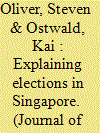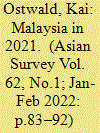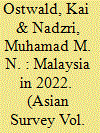|
|
|
Sort Order |
|
|
|
Items / Page
|
|
|
|
|
|
|
| Srl | Item |
| 1 |
ID:
142073


|
|
|
|
|
| Summary/Abstract |
A recent Pacific Affairs special issue explores key dimensions of the discipline/area studies divide in the context of Southeast Asia. It asks whether it is possible to use the comparative methods favoured by disciplines while doing justice to the rich nuance of individual cases. We offer a practical perspective on this debate. We argue that the demands of discipline audiences and area-studies audiences can vary significantly, making it difficult to effectively address both within a given project. Furthermore, while individual scholars retain agency over the nature of their research, structural factors like the job market and tenure requirements nudge junior scholars towards disciplinary audiences. We support this claim with an analysis of several academic job markets across the social sciences and humanities. We also interview several junior scholars who focus on Southeast Asia to examine the channels that link structural factors with scholarly orientations, finding both direct and backchannel connections. We conclude that in the absence of structural changes to the hiring and promotion practices at major universities, the question of an ideal balance between comparative approaches and deep area nuance will be answered by practical—rather than ontological or normative—concerns.
|
|
|
|
|
|
|
|
|
|
|
|
|
|
|
|
| 2 |
ID:
160630


|
|
|
|
|
| Summary/Abstract |
The People's Action Party (PAP) of Singapore is one of the world's longest ruling dominant parties, having won every general election since the country's independence in 1965. Why do Singaporeans consistently vote for the PAP, contrary to the expectations of democratization theories? We argue that valence considerations—specifically, perceptions of party credibility—are the main factor in the voting behavior of Singapore's electorate, and are critical to explaining the PAP's resilience. Furthermore, we argue that the primacy of valence politics arose in part by design, as the PAP has used its control of Singapore's high-capacity state to reshape society and thereby reshape voter preferences towards its comparative advantages. We use a multi-methods approach to substantiate this argument, including a comprehensive quantitative analysis of recent elections. Ultimately, our findings suggest that a focus on valence politics can increase the resilience of dominant parties, but that such a strategy also faces natural limits.
|
|
|
|
|
|
|
|
|
|
|
|
|
|
|
|
| 3 |
ID:
156966


|
|
|
|
|
| Summary/Abstract |
Malaysia has a federal structure of government, suggesting substantial decentralization. In practice, however, the autonomy of subnational tiers has been systematically undermined through a range of mechanisms examined in this paper, creating a system that is highly centralized in practice. With power concentrated in the Prime Minister’s Department, the elite core of the dominant United Malays National Organization (UMNO) has increased its resilience to political challenges from within and beyond the party. This has come at the expense of developmental gains — subnational governments have insufficient fiscal and administrative capacities to efficiently leverage the theoretical advantages of decentralized decision making. In short, the relationship between tiers of government is optimized to preserve the power of the UMNO elite, rather than deliver governance improvements and comprehensive growth; this has negative implications for Malaysia’s ability to escape the middle-income trap.
|
|
|
|
|
|
|
|
|
|
|
|
|
|
|
|
| 4 |
ID:
185203


|
|
|
|
|
| Summary/Abstract |
Malaysia remained firmly in the grip of both the COVID-19 pandemic and economic turmoil in 2021. Ongoing political instability led to an emergency proclamation that suspended Parliament for the first time since 1969, followed by an unprecedented public rebuke of political leaders by the Malaysian king, and the third new government in as many years. This returned the long-dominant UMNO to power. An unexpected political ceasefire promised extensive reforms, but their implementation was uncertain.
|
|
|
|
|
|
|
|
|
|
|
|
|
|
|
|
| 5 |
ID:
190038


|
|
|
|
|
| Summary/Abstract |
Malaysia held a general election in 2022 that was expected to resolve ongoing political instability. Instead, it produced a hung parliament, reflecting a deeply divided electorate and growing support for Islamist politics. Following a royal intervention, Anwar Ibrahim’s progressive coalition formed a unity government with the long-dominant UMNO and East Malaysian parties; this unprecedented arrangement faces evolving social, political, and economic challenges that will test its stability and the very nature of Malaysian politics.
|
|
|
|
|
|
|
|
|
|
|
|
|
|
|
|
| 6 |
ID:
175593


|
|
|
|
|
| Summary/Abstract |
Singapore’s 2020 general election was held amidst the country’s most serious public health and economic crises in the country’s history. Despite expectations that these parallel crises would precipitate a flight to safety and result in a strong performance by the dominant People’s Action Party (PAP), the ruling party received its third lowest popular vote share (61.2%) and lowest ever seat share (89.2%) since independence. This article engages explanations for the unexpected results and argues that the vote swing against the PAP was enabled by a hitherto largely overlooked factor: the 2020 election included two opposition parties that could credibly compete with the PAP on the valence considerations that drive voting behaviour in Singapore, giving voters a perceived safe alternative to the PAP at the constituency level. Quantitative tests support the notion that party credibility—rather than demographic factors, incumbency advantages, Group Representation Constituencies, or assessments of the PAP’s fourth generation leaders—best explain variation in the vote swing against the PAP. Ultimately, the results suggest that the PAP’s monopoly on party credibility is no longer assured, thus portending greater opposition competitiveness and pressure against the PAP in future elections. Nonetheless, the PAP’s dominance remains intact and there is little evidence of a general appetite among the electorate for a non-PAP government, suggesting the likelihood of smaller course corrections rather than major steps towards democratization in the coming years.
|
|
|
|
|
|
|
|
|
|
|
|
|
|
|
|
|
|
|
|
|